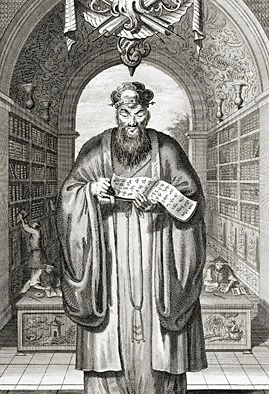Analects of Confucius
Publié le 22/02/2012

Extrait du document

The most important
book containing the teachings of CONFUCIUS (551–
479 B.C.E.), the founder of CONFUCIANISM. Confucius
was one of the most infl uential teachers who
ever lived. But he did not actually write down his
teachings. After his death, his followers gathered
his sayings. They were eventually collected into a
book, the Analects. The Analects was put together
perhaps in the third century B.C.E.
The Analects does not expound Confucius's
ideas in a neat, orderly sequence chapter by chapter.
It also does not contain stories about Confucius's
birth, activities, and death, as, for example,
the GOSPELS do about JESUS. Instead, the Analects
contains short statements, sometimes no more
than a single sentence long, unconnected with one
another. These statements claim to present Confucius's
teachings in his own words. The following
saying is typical: "Tzu-kung asked, ‘Is there a single
word which can be a guide to conduct throughout
one's life?' The master said, ‘It is perhaps the
word "shu [reciprocity]" Do not impose on others
what you yourself do not desire' " (Analects 15.24
[Lau tr.]).
In the Analects, Confucius instructs his students,
who were male, on how to become gentlemen.
To Confucius a gentleman was more than
someone who is courteous and polite. He was
someone with moral depth. Confucius considered
the gentleman to be the ideal of what it means for
most people to be human. (A few go beyond being
gentlemen. They are sages.)
In Confucius's eyes, what characterizes a
gentleman is humaneness. Humaneness has two parts. One part is the golden rule: As Confucius
formulated it, do not do to someone what you
would not wish them to do to you. The other part
talks about how one should conduct oneself: One
should always strive to do one's best.
Confucius believed that people had to work
hard to realize virtue to the fullest. Virtue had to be
cultivated through a process that lasted a lifetime.
The process began at home, with obedience and
respect—the "fi lial piety"—that children showed
their parents. If one did not love one's parents,
Confucius asked, how could one love other members
of society? The process of cultivating virtue
continued in society as a whole. It did so as people
observed the rules of proper behavior. Confucius
believed that one nurtured virtue, which is ultimately
an internal quality, through one's external
behavior. (Compare some North American parents,
who teach their children gratitude, an internal
quality, by telling them to say "thank you," an
external act.)
Confucius expected his gentlemen to be members
of the government. He had a very specifi c idea
of how it was best for them to rule. By passing
laws and meting out punishments, Confucius said,
one could maintain order, but one would not make
people more virtuous. The better way to rule was
by being virtuous and observing proper behavior
oneself. That way, people would develop a sense
of shame and as a result govern themselves. These
ideals of government often strike North Americans
as unrealistic. It is good to remember, then, that
for centuries the Chinese government ruled a very
large territory at least in part by putting Confucius's
ideals into practice.
Liens utiles
- Confucius: ENTRETIENS ou ANALECTES
- Confucius
- Extrait des entretiens de Confucius
- Confucius, Entretiens (extraits) - anthologie.
- Confucius par Etiemble Professeur à la Faculté des Lettres, Montpellier Ce qu'on sait du vrai Confucius historique se réduit à peu de choses : quelques noms, quelques dates, le lieu de sa mort ; hors cela, des anecdotes d'authenticité douteuse.
